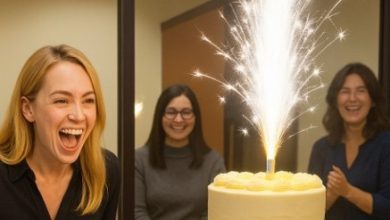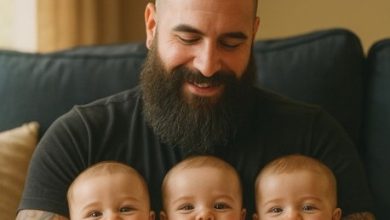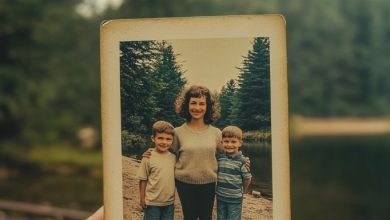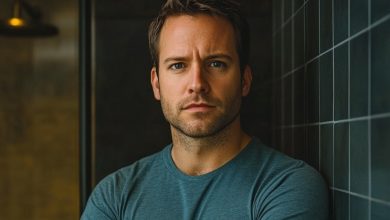My aunt fought to gain custody of my brother—but I already knew what she was really after.
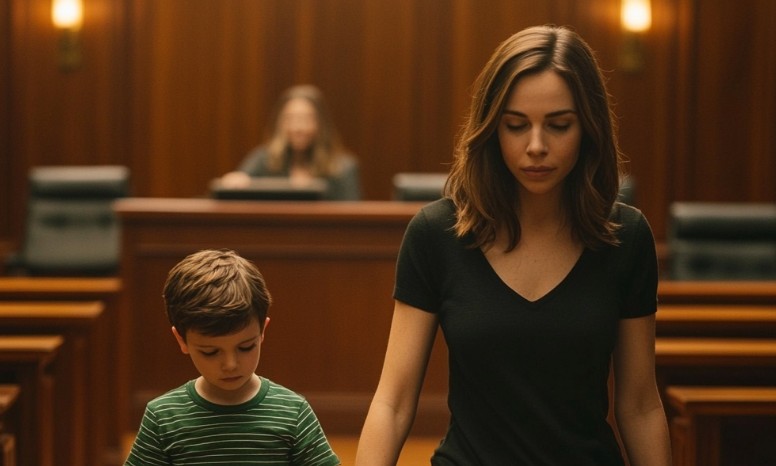
The morning after I laid my parents to rest, something inside me changed forever. It wasn’t a birthday celebration or some milestone I had been waiting for. It happened because someone out there tried to snatch away the only family I had left. And I knew right then I wouldn’t stand by and let that happen.
I was eighteen years old. Legally an adult, but in my mind I still felt like a kid who had never really learned to take care of himself. Now, here I was, staring down the hardest moment of my life: the day after burying both of my parents, left alone with my little brother, Max, who was only six. Max still believed our mom was away on a long trip. He hadn’t yet grasped that she wouldn’t be coming back.
If that wasn’t cruel enough, the funeral fell on my birthday. Friends and distant relatives came up to me at the graveside, forced smiles on their faces, and said, “Happy eighteenth!” as though it made the day any better. It didn’t. I didn’t want a cake. I didn’t want balloons or gifts. All I wanted was for Max to stop asking, “When’s Mommy coming home?”
That afternoon, the wind was cold and the sky was gray. My black dress shoes felt too tight. My suit felt heavy. We were still dressed in black when I knelt before the freshly dug dirt and whispered to the grave, “I promise you, Max, I won’t let anyone take you away. Ever.” I looked up, hoping to meet Max’s eyes, but he was clutching a worn-out teddy bear, looking so small and lost.
It turned out that some people did not agree with my promise.
A week after the funeral, my aunt Diane and uncle Gary invited Max and me to their house. It was a bright spring afternoon, but their living room felt chilly. Aunt Diane’s voice was soft when she offered me a mug of hot cocoa I hadn’t asked for. Uncle Gary gave me a tight nod. Their kitchen was spotless, the table set as though they expected royalty. In one corner, Max sat on a chair, sticking dinosaur stickers into a notebook, blissfully unaware of the real reason we were there.
“You know it’s for the best, Ryan,” Aunt Diane said, patting my arm in a way that felt more like a takeover than a friendly gesture. “You’re still just a kid yourself. No job, still in school. Kids need stability, a real home.” She glanced at Max, who was busy pressing a tiny green T-Rex onto the page. “And we can give him that.”
Uncle Gary chimed in, “Yes, a proper home where someone can take care of him full time.”
I bit my lip until it stung, but I kept my voice steady. “This is his home,” I said, “and it’s my home, too.”
But Diane and Gary were not convinced by words. The very next morning, I learned they had filed legal papers to gain custody of Max. The truth hit me like a train. This wasn’t about our well-being. It was a plan—and it was already in motion.
Right then and there, I made a decision. I marched into the college enrollment office and told them to withdraw my name. They asked, “Are you sure you want to leave?” I nodded before they could finish their question. “Yes,” I said. “I need to fight for my brother first. Education can wait.”
By noon, I had the paperwork in hand. I took on two jobs. From nine to five, I worked at a small café, taking orders, making sandwiches, and putting on a polite smile even when customers were rude. Then, from seven in the evening until midnight, I cleaned offices for a local law firm. I spent my nights scrubbing floors and wiping down counters, dreaming that one day I’d be inside a courtroom defending my brother’s right to stay with me.
We could no longer afford our old house. The mortgage was gone. Utilities were shut off. So I found a tiny studio apartment on the outskirts of town. It was the size of a closet, with a narrow hallway that led from the front door straight to a single room. One mattress sat against the wall on the left. A futon squeezed against the right wall. The kitchenette was little more than a hot plate and a mini-fridge. The bathroom was so small that when you shut the door, you could barely stand up. The air always smelled faintly of cleaning spray mixed with last night’s pizza.
Still, Max smiled. One evening he pulled his blanket up over his shoulders, wrapped himself tight like a little burrito, and said, “This place is tiny, but it feels warm. It smells like pizza… and home.”
I almost broke down right there. But that smile on his face gave me more strength than I ever thought I had. I hired a lawyer and filed papers for legal guardianship. I knew my age worked against me, and I knew the odds were long. But every time I looked at Max, I knew it had to count for something.
Then one morning, my world flipped again. I was folding laundry when a knock came at the door. The social worker from Child Services stood there, a thick report in her hand. I stepped aside to let her in. She cleared her throat.
“Ryan,” she began, “I have some concerns from your aunt. She’s filing a complaint.”
My heart thudded. “What did she say?”
“She claims you’ve been leaving Max alone for long periods. She says you shout at him and have even been physically harsh more than once.”
My chest tightened. I stared at her report, words swirling across the page. I couldn’t breathe. I thought of Max laughing at my silly voices, the way he pressed his ear against my chest during thunderstorms, safety in me. I would never hurt him.
But doubt had been planted.
What my aunt had counted on was that doubt. A seed of suspicion that could grow into a forest of trouble. If they believed her, they could take Max away from me forever.
What she hadn’t counted on was our neighbor, Ms. Harper. She was a retired third-grade teacher who lived next door. Every afternoon, she would watch Max for an hour or so while I grabbed a quick meal or caught a moment of sleep. She knew me, knew Max, knew the bond we shared. And once she heard about Diane’s allegations, she was furious.
When my court date arrived, I walked in feeling more terrified than I ever had. I sat at the defense table, my lawyer beside me holding a stack of documents. Across the room sat Diane and Gary, looking smug. Diane’s hair was perfectly styled. Gary was checking his watch. They acted as though they’d already won.
First, the social worker gave her testimony. She spoke carefully, reading from her notes about reliability and adult supervision laws. I watched Max fidget in the gallery seats, his little hands squeezing the edge of the pew.
Then our neighbor, Ms. Harper, rose to speak. She carried a single manila envelope and wore a string of pearls that glinted under the courtroom lights. She strode forward with quiet confidence, and when she addressed the judge, I felt the walls around me crack.
“Your Honor,” she said, “I am Ms. Eleanor Harper. I lived next door to the late Mrs. Walker for nearly ten years, and since the accident, I have spent dozens of afternoons and evenings with these two boys. I can tell you, without hesitation, that Ryan has been a devoted brother and caretaker to Max. He is patient, kind, and completely responsible. He never leaves Max alone for unreasonable periods, he never raises his voice in anger, and he certainly never harms him.”
She paused, looking at me, then back to the judge.
“I have records — my own calendar logs — of the hours I’ve spent with Max. I’ve driven him to school, attended parent-teacher conferences on Ryan’s behalf, and let him stay with me when Ryan had to work late. I have seen the love in Ryan’s eyes whenever he talks to his brother. And I have seen the fear in Max’s eyes whenever I mention someone else wanting custody.”
Ms. Harper handed the judge the envelope. Inside were her calendar pages, notes from PTA meetings, and even old photographs of Ryan and Max playing at the park next to her house. The judge took them, glanced through them, and gently placed them on the bench.
A hush fell over the room. Diane’s bright smile faded. Gary shifted uncomfortably in his seat.
The judge thanked Ms. Harper and asked Diane if she had any further evidence. Diane’s face went blank. She whispered something to Gary, but he just shook his head. No more evidence came forward.
In the end, the judge did not immediately rule in my favor, but she agreed custody should remain with me under supervision. Diane would only have limited, supervised visits. It was not a complete victory, but it was enough for us to breathe again.
Two afternoons a week, I drop Max off at Diane’s for her scheduled visits. My stomach twists every time, but I remind myself the court ordered it and I must comply. I don’t want to give them any reason to say I am defying the court.
One Wednesday I arrived fifteen minutes early. The house was too clean, too quiet. Diane opened the door with that tight expression she wore when she thought she was being kind.
Max ran into my arms, his face streaked with tears. He clung to my hoodie like it was the only lifeline left in the world.
“She said if I don’t call her Mommy, I won’t get dessert,” he whispered, voice cracking, tiny arms around me so tight I felt his ribs.
I knelt, carefully brushing his hair out of his eyes. “You never have to call anyone Mommy except our mom,” I told him. He nodded, but his lip trembled.
That night, sleep escaped me. I couldn’t stop thinking about his tear-stained cheeks. I needed proof. I needed to show the court what Diane was really after.
The next day, I quietly followed their routine—same delivery window for groceries, same route past their back door. I stopped at a spot near a kitchen window and held my phone ready. I didn’t need to hide; I just needed evidence. Through the glass, I saw Diane and Gary on a speakerphone, voices loud enough to carry through the air.
“We need to move faster,” Diane said, agitated. “That money in the trust fund is going nowhere if custody isn’t finalized.”
Gary’s voice came through next. “Once we have custody, the state will release the funds. We get the money, and we can do whatever we want. New car, vacation—whatever we’ve been dreaming of.”
Diane chuckled, a cold, hollow sound. “And Max can go to boarding school if he’s too much trouble.”
I hit stop on the recording. My blood ran cold. Max had a trust fund. Set up by our parents after the accident—which Diane must have known about all along and was counting on. That money was for my brother’s future, not a padded bank account for them.
As soon as I got home, I emailed the recording to my lawyer. We scheduled an emergency hearing.
The day of the final custody hearing, Diane arrived with a tin of so-called homemade cookies, pearls around her neck, acting as cheerful as a hostess at a garden party. I walked in with my lawyer, armed with truth. We handed the judge a copy of the recording and waited.
When the judge pressed play, the voices filled the courtroom. Diane’s voice. Gary’s schemes. The laughter at the idea of shipping Max off to boarding school. The promise of the trust fund.
I watched Diane’s face drain of color. She opened her mouth but no words came out. Gary swallowed and turned away. When the recording ended, silence pressed down.
“You used a child as a pawn for personal gain,” the judge said, voice flat and unforgiving. “You tried to manipulate the courts to access money you had no right to.” She looked at Diane and Gary in turn. “This court finds that your actions are not in the best interest of the child. Custody is awarded to the natural guardian, Mr. Walker.”
Diane’s lips trembled. The cookies were left untouched on a side table. Gary’s hands shook. I felt a wave of relief wash through me.
The judge didn’t just grant me full guardianship; she also noted my “exceptional effort under extremely challenging circumstances” and referred me to a housing support program to help stabilize our living situation. I fought so hard for this, and at last, we were free from their grasp.
Outside the courthouse, Max grabbed my hand so tightly I thought he might never let go. He looked up at me, eyes bright, hopeful.
“Are we going home now?” he asked.
I knelt, brushing his hair back the way I always do. “Yes, buddy,” I said, my voice thick with emotion. “We’re going home.”
And as we walked down those steps together, leaving Diane and Gary behind, I felt the weight lift from my shoulders. We had made it. We were safe. We were truly a family again.
Two years have passed since that day. I work full time at a community center by day and take classes online at night. My dream of finishing college is still alive, but right now my priority is Max. He’s in second grade, doing great—making friends, learning to read, and telling everyone that his big brother is his hero. We still share a small apartment, squished between the same mattress and futon, still bicker over who picks the movie on Friday nights, and still laugh until our sides ache at bedtime stories gone off-script.
I’m far from perfect. I stumble, I lose my temper, I miss deadlines. But every night, when Max crawls into bed beside me and murmurs, “You never gave up on me,” I know I did the right thing.
Because growing up isn’t about birthdays or certificates. It’s about standing up when it matters most, fighting for the people you love, and never letting go—no matter how hard the world tries to pull you apart.
And when he looks at me with those trusting eyes, I promise myself I will never let him down. Not ever.
